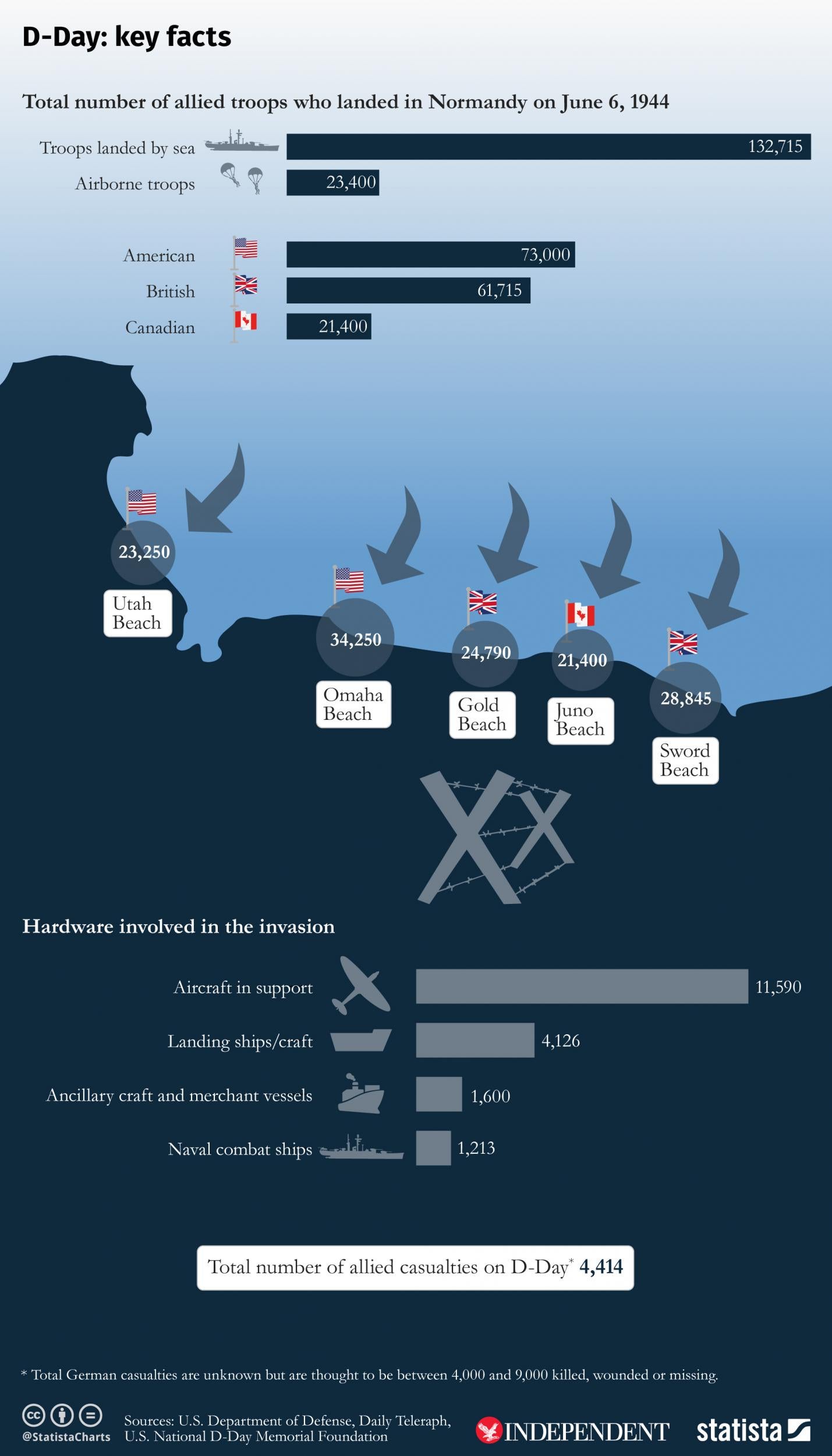D-Day anniversary: What you need to know about 75th commemoration of the Normandy landings
World leaders gather in Portsmouth for 'one of greatest British military spectacles in recent years'
Theresa May, Donald Trump and 14 other world leaders will join the Queen and Prince Wales to commemorate the 75th anniversary of the D-Day landings in Portsmouth.
On 6 June 1944, Allied forces invaded Normandy to begin the liberation of Europe from Nazi and fascist occupation. D-Day is widely regarded as the biggest amphibious military invasion in history.
Commemorations start on Wednesday morning at Southsea Common in Portsmouth.
The event’s primary goal is to honour the Allied soldiers who risked and lost their lives during the operation. But the commemoration will also mark the end of Mr Trump’s state visit to the UK.
Here is a short guide to what you might want to know about the day.
So, what exactly is happening?
The UK has promised “unprecedented commemorations” and “one of the greatest British military spectacles in recent years”.
Over 4,000 military personnel will be involved in the UK and France.
The event will include testimony from veterans, theatre performances and live music.
In the morning, Ms May and the defence secretary, Penny Mordaunt, will be on the HMS Queen Elizabeth as they wave off around 300 veterans who fought 75 years ago. All of them are aged over 90 and will recreate the journey they made in 1944.
Two more veterans will fly across the Channel and parachute down over Normandy. One of them, Harry Read, is 95 years old.
The world leaders will then have a reception with veterans before sitting down to discuss the continued importance of the Western alliance and security, a Downing Street spokeswoman said.
Will there be a flypast?
Yes. The event will end with a flypast of 24 vintage and modern aircraft, including the Red Arrows and the historic Spitfire.
Which countries will attend?
Representatives from 15 countries – all of those who fought alongside the UK in Normandy – are planning to attend.
It will be the first time the UK has hosted so many world leaders outside a formal summit since the 2012 Olympics, the government said in a statement.
There will be presidents, prime ministers and other representatives of the United States, Canada, Australia, Belgium, the Czech Republic, Slovakia, Luxembourg, Denmark, France, Greece, the Netherlands, New Zealand, Norway and Poland.
German Chancellor Angela Merkel will also attend the commemorations in Portsmouth and have lunch with Ms May.
Any notable absences?
It doesn’t look likely.
So, what exactly were the D-Day landings?
On the night of 5 June 1944, Allied forces launched a naval, air and land assault on Normandy, a region in northwest France. D-Day was the first phase of Operation Overlord; the Allies’ plan to liberate Europe.
First, Allied forces bombarded the coast of France. Then, shortly after midnight, over 20,000 troopers parachuted into drop zones to establish a foothold in northern France. Later, at around 6.30 am, infantry and armoured troops began landing on the Normandy coast.
Nearly 160,000 troops crossed the Channel that day, and almost 900,000 landed by the end of June.

Some 4,414 Allied soldiers were confirmed dead, but casualties are estimated to be over 10,000. Some 4,000 to 9,000 German soldiers are thought to have lost their lives.
The landings required unprecedented international cooperation and planning, including to stockpile resources and to mislead German intelligence about the exact date and location of the operation.
Germany expected an invasion and was planning to fortify the Atlantic coasts under its control, under a plan known as the "Atlantic Wall".

What will Mrs May and Mr Trump say?
Ms May will describe the D-Day landings as a “moment of historic international cooperation” and emphasise that while the challenges the world faces today are different from those of 75 years ago, international cooperation and a Western alliance remain important today.
She will also read a letter written by Captain Norman Skinner of the Royal Army Service Corps to his wife Gladys on 3 June 1944, which was in his pocket when he landed on Sword Beach on 6 June. He was killed the following day, leaving his wife and two young daughters.
“I can imagine you in the garden having tea with Janey and Anne getting ready to put them to bed,” the letter reads.
“Although I would give anything to be back with you, I have not yet had any wish at all to back down from the job we have to do.”
We don’t know what Mr Trump will say. The commemoration will mark the end of his visit to the UK, which has been fraught with controversy and demonstrations.
What happens next?
The commemorations will carry on in Normandy on Thursday, where the military and French paratroopers will recreate the invasion.
Ms May will be there alongside the French president, Emmanuel Macron, to attend services of commemoration at the cathedral and cemetery in Bayeux – the first town to be liberated by allied forces.
Join our commenting forum
Join thought-provoking conversations, follow other Independent readers and see their replies
Comments
Bookmark popover
Removed from bookmarks